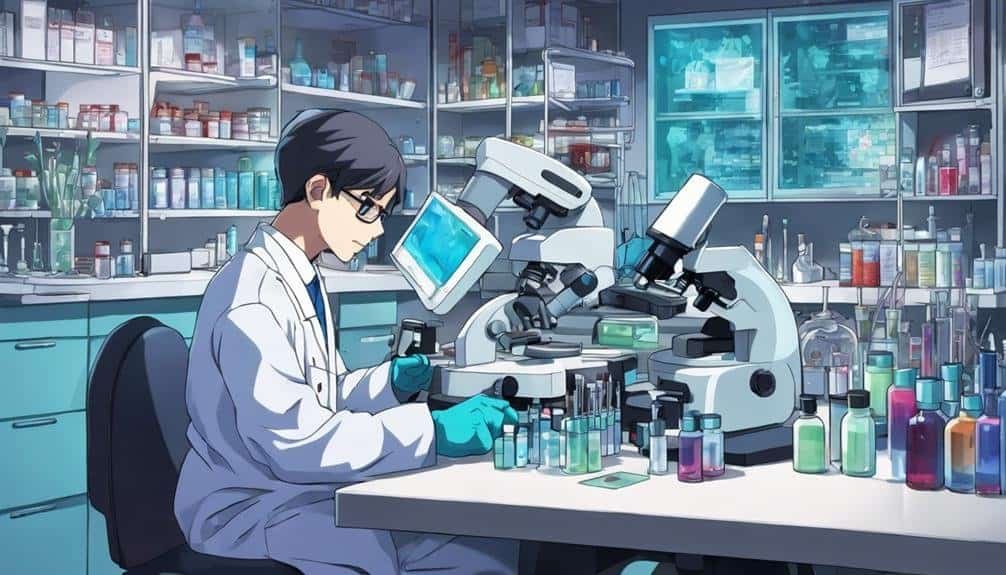Job Duties for Medical Laboratory Technician
The role of a Medical Laboratory Technician carries a diverse set of responsibilities that are integral to the functioning of healthcare facilities. From the collection of samples to the precise processing and testing in the laboratory, their duties span various important aspects of diagnostic procedures.
Ensuring quality control measures are met, analyzing data accurately, and maintaining equipment are just a few components of their day-to-day tasks. Additionally, meticulous record-keeping is paramount to track and communicate results effectively.
The intricacies of these duties illustrate the essential role of Medical Laboratory Technicians in the healthcare system, showcasing their critical contribution to patient care and diagnosis.
Key Takeaways
- Efficient sample collection and processing techniques ensure accurate test results.
- Reliable laboratory testing and analysis for providing actionable information to healthcare providers.
- Rigorous quality control measures maintain precision standards and process efficiency.
- Meticulous record-keeping and compliance documentation for consistency and integrity assurance.
Sample Collection
Efficient sample collection is a fundamental aspect of the responsibilities undertaken by medical laboratory technicians in the course of their daily work. Proper technique is paramount in ensuring the accuracy and reliability of test results. Medical laboratory technicians must adhere to strict protocols when collecting samples to avoid contamination and guarantee the integrity of the specimen. This includes using sterile equipment, following aseptic techniques, and properly labeling each sample to prevent mix-ups.
Safety precautions are also vital during sample collection to protect both the patient and the technician. Medical laboratory technicians must wear appropriate personal protective equipment such as gloves, masks, and lab coats to minimize the risk of exposure to infectious materials. Proper disposal of used materials and adherence to biohazard protocols are essential to maintain a safe working environment.
Specimen Processing
During the phase of specimen processing, meticulous attention to detail is essential for medical laboratory technicians to maintain the integrity and accuracy of test results. Specimen handling involves receiving samples, verifying information, and ensuring proper storage to prevent contamination or degradation. Efficient workflow optimization is important to process samples promptly without compromising quality. Technicians must follow protocols for labeling, centrifugation, aliquoting, and transporting specimens to different laboratory departments. Proper storage conditions, such as temperature and humidity control, are essential to preserve sample integrity until testing. Regular inventory checks and rotation of stock prevent expired reagents or supplies from affecting results. By streamlining processes and implementing quality control measures, technicians contribute to the overall efficiency of the laboratory. Emphasizing accuracy and timeliness in specimen processing guarantees reliable test outcomes and enhances patient care.
| Specimen Handling & Storage | Workflow Optimization & Efficiency |
|---|---|
| – Receive and verify samples | – Follow protocols for processing |
| – Ensure proper storage | – Implement quality control measures |
| – Prevent contamination | – Streamline processes |
| – Maintain sample integrity | – Enhance laboratory efficiency |
| – Conduct inventory checks | – Prioritize accuracy and timeliness |
Laboratory Testing
In the domain of laboratory testing, medical laboratory technicians play a pivotal role in conducting various diagnostic analyses to aid in patient diagnosis and treatment planning. When it comes to laboratory testing, accuracy and precision are paramount for providing reliable results that healthcare professionals can depend on for making critical decisions.
Here are some key aspects of laboratory testing that medical laboratory technicians are involved in:
- Ensuring test accuracy through proper sample handling and testing procedures.
- Performing a variety of tests following standard protocols to generate precise results.
- Utilizing advanced laboratory equipment to conduct tests efficiently and accurately.
- Interpreting test results and reporting findings to healthcare providers for further analysis.
- Collaborating with other healthcare professionals to discuss test results and their implications on patient care.
Quality Control
Medical laboratory technicians are responsible for implementing rigorous quality control measures to guarantee the accuracy and reliability of laboratory test results. Error detection is a vital aspect of quality control in a medical laboratory setting. Technicians must meticulously review and analyze test results to identify any discrepancies or irregularities that may impact the outcome. By closely monitoring the testing processes and results, technicians can promptly detect errors and take corrective actions to make sure the validity of the data produced.
Additionally, process improvement plays a significant role in maintaining high-quality standards within a medical laboratory. Technicians are continuously evaluating and optimizing laboratory procedures to enhance efficiency and accuracy. This may involve reviewing workflow processes, updating protocols, or incorporating new technologies to streamline operations and minimize the risk of errors. Through a proactive approach to quality control and process improvement, medical laboratory technicians uphold the highest standards of precision and reliability in delivering accurate test results for patient diagnosis and treatment.
Data Analysis
To guarantee the accuracy and reliability of laboratory test results, medical laboratory technicians engage in thorough data analysis to identify patterns and trends that may impact the interpretation of diagnostic information. Data analysis involves various key aspects that are vital for ensuring the quality of results and providing valuable insights for healthcare professionals.
Some important components of data analysis in the field of medical laboratory technology include:
- Data interpretation: Medical laboratory technicians must possess the skills to interpret complex data sets accurately to draw meaningful conclusions.
- Statistical analysis: Utilizing statistical tools and techniques to analyze data sets and derive relevant statistical measures for decision-making.
- Research implications: Understanding the implications of data analysis results on ongoing research projects and potential advancements in medical science.
- Data visualization: Presenting data in visual formats such as graphs or charts to facilitate easier understanding and communication of findings.
- Quality assurance: Ensuring that data analysis processes adhere to strict quality control measures to maintain the integrity of results.
Equipment Maintenance
Ensuring the upkeep of tools and machines is essential for a Medical Laboratory Technician to maintain accurate and reliable results. Machine calibration procedures play an important role in guaranteeing the precision of test outcomes.
Proper equipment maintenance is necessary to uphold quality standards and ensure the efficiency of laboratory operations.
Tool Upkeep Importance
Why is regular maintenance of equipment important in a medical laboratory setting? Maintenance protocols play an essential role in ensuring equipment longevity and maximizing performance. Here are five key reasons emphasizing the importance of tool upkeep in a medical laboratory:
- Prevention of Malfunctions: Regular maintenance helps prevent unexpected breakdowns.
- Accuracy and Reliability: Well-maintained tools ensure accurate and reliable test results.
- Compliance with Standards: Proper tool care ensures adherence to quality and safety standards.
- Workflow Efficiency: Maintained equipment contributes to smooth workflow operations.
- Cost-Effectiveness: Timely maintenance reduces the need for costly repairs or replacements.
Adhering to stringent maintenance schedules is crucial for sustaining equipment functionality and enhancing overall laboratory efficiency.
Machine Calibration Procedures
Regular machine calibration procedures are essential for maintaining the accuracy and reliability of equipment in a medical laboratory setting. Calibration precision guarantees that equipment accuracy is upheld, meeting the stringent standards required for laboratory testing.
Following calibration standards is imperative to guarantee the validity of results obtained from the machines. In case of deviations or inaccuracies, troubleshooting techniques need to be applied promptly to identify and rectify the issues. Technicians must be meticulous in their calibration procedures, documenting each step carefully to track changes and assure consistency in results.
Record Keeping
Maintaining accurate and detailed records is a fundamental aspect of the responsibilities undertaken by Medical Laboratory Technicians. In the medical field, precise record-keeping is critical for ensuring patient safety, tracking test results, and complying with regulatory standards. Here are five key aspects of record keeping for Medical Laboratory Technicians:
- Information Management: Organizing and managing data effectively to guarantee easy accessibility and retrieval.
- Data Tracking: Monitoring and recording data accurately to track trends and changes over time.
- Documentation Organization: Structuring records in a systematic manner to facilitate quick reference and analysis.
- Data Storage: Safely storing data to prevent loss or unauthorized access, following data protection protocols.
- Compliance Documentation: Ensuring that all records meet regulatory requirements and quality assurance standards.
Conclusion
To sum up, medical laboratory technicians play a vital role in the healthcare system. They perform various duties such as sample collection, specimen processing, and laboratory testing. They also handle quality control, data analysis, equipment maintenance, and record keeping.
Despite the potential concern regarding the repetitive nature of these tasks, it is essential to recognize the precision and attention to detail required. This precision ensures accurate and reliable results for patient diagnosis and treatment.







